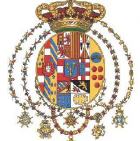This Act is the principal weapon in the armory of the supporters of the late Prince don Ranieri and his son the present claimant, Prince don Ferdinando, both styled Duca di Castro. Its text is clear. Nowhere is any mention made of the Constantinian Order. The only renunciations are (a) of the eventual succession to the Crown, and (b) to certain properties of the family established to provide a majorat for the head of the Dynasty and Family and to constitute a dowry fund for the Princesses. It specifically conserved that which came from other legacies, among which should surely be included the Constantinian Grand Magistery, inherited under the Statutes by male primogeniture succession and the Will of Francesco and Antonio Farnese. The Act does not conform to the requirements of the Pragmatic Decree of 1759, which it purports to be subject to and is therefore in conflict with the laws and constitutions of the Two Sicilies.
Immediately prior to the signing of the Act, the correspondence between the Count of Caserta and the Queen Regent had determined that the only renunciation necessary was one of former nationality. The Queen had been specifically advised on December 4th 1900 that no renunciation by Prince Carlo could be legally binding.
A. The Act reads in its crucial clauses: "Si è presente Sua Altezza Reale il Principe D. Carlo Nostro amatissimo Figlio ed ha dichiarato che dovendo Egli passare a Nozze con Sua Altezza Reale el Infanta Donna Maria Mercedes, principessa delle Asturie, es assumendo per tal matrimonio la nazionalità e la qualità di Principe Spagnuolo, intende rinunziare, come col presente atto solennemente rinunzia per Sé e per i suoi Eredi e Successori ad ogni diritto e ragione alla eventuale successione alla Corona delle Due Sicilie ed a tutti i Beni della Real Casa trovantasi in Italia ed altrove e ciò secondo le nostre leggi, costitzioni e consuetudini di Famiglia ed in esecuzione della Prammatica del re Carlo III, Nostro Augusto antenato, del 6 ottobre 1759, alle cui prescrizioni egli dichiara liberamente esplicitamente sottoscrivere ed obbedire. / Dichiara inoltre particolarmente di rinunziare per Sé , suoi Eredi e Successori a quei beni e valori eistenti in Italia, a Vienna ed a Monaco di Baviera, destinati dalla Maestà del Re Francesco II (di s.m.) per la fondazione di un Maggiorato pel Capo della Dinastia e Famiglia delle Due Sicilie, e per la costituzione di un fondo dotale delle Reali Principesse nubili, nipoti dei Nostro Augusto Genitore il Re Ferdinando II (di s.m.); ma conservando i suoi diritti a quella parte dei beni legatigli testamentariamente del suo rimpianto Zio il re Francesco II, pel caso che il Governo italiano, che indebitamente li ritiene, ne facesse la dovuta restituzione e cosi a tutto cio che potrebbe in seguito rinvenirgli per altri legati testamentari ......".
B. The renunciation was to the "eventual succession" to the "Crown", which no longer existed; one cannot renounce (a) an anticipated succession in civil law, nor (b) something which does not exist. Renunciations of anticipated successions were specifically forbidden by the Civil Code of the former Kingdom of the Two Sicilies, the Civil Code of the Kingdom of Italy (of which the Count of Caserta and his family were legally citizens) and the Civil Code of France where the act was signed.
C. It was clearly impossible to obey the prescriptions of the Pragmatic Decree of 1759, which only required a renunciation of the Two Sicilies Sovereignty in the event of their union with the person of the Spanish Sovereign or Heir Apparent, as they conflicted with the terms of the purported renunciation made here.
D. Although he specifically renounced his right to inherit the properties set up to maintain the Head of the House and Dynasty (again in conflict with civil law which prohibits anticipatory renunciations), he did not renounce the Headship itself. Since the renunciation specifically includes the "eventual succession to the Crown" but it was still felt necessary to renounce separately his rights to the property and funds established for the maintenance of the Head of the Dynasty and Family, it must be presumed that he still retained his rights to the succession to those Dignities. If his renunciation of the "eventual succession to the Crown" was considered to also embrace his right of succession to the Headship of the Dynasty and Family, the renunciation of the properties attached to the Headship would have been unnecessary. The renunciation of the properties was made because he was marrying into a wealthy family and his brothers were impoverished.
E. By specifically retaining his rights to other testamentary legacies, they must presumably include the donations made to his ancestor Charles III in the Testaments of Francesco and Antonio Farnese which included the Constantinian Grand Magistery.
F. At the same time, nothing is specifically stated regarding the Constantinian Grand Magistery which passes by male primogeniture succession and is entirely separate and independent from the Crown of the Two Sicilies.





